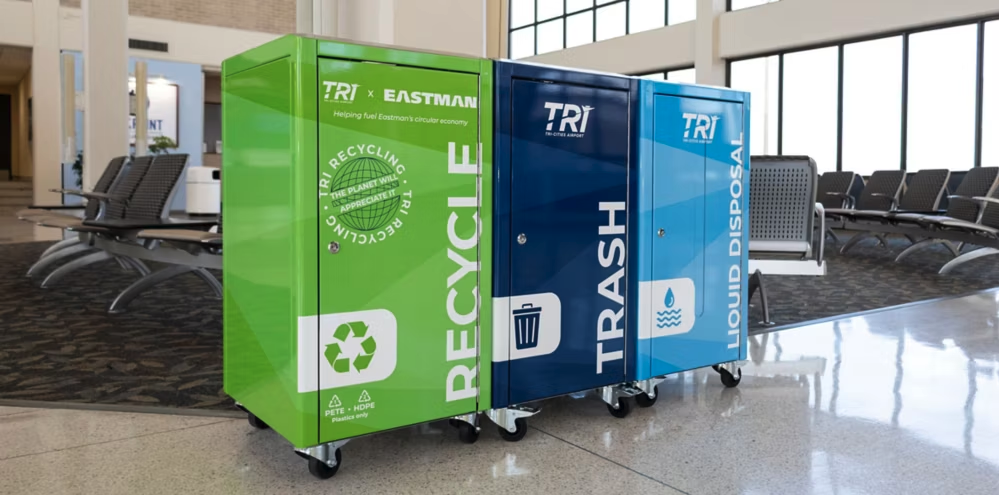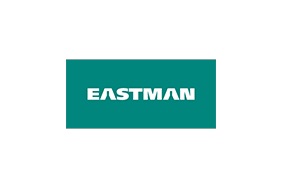Eastman and Tri-Cities Airport Partnering To Collect Plastic Waste
Published 07-24-24
Submitted by Eastman

KINGSPORT, Tenn., July 24, 2024 /CSRwire/ - Eastman, a global specialty materials company, and Tri-Cities Airport, a regional airport serving the Tri-Cities, Tennessee, area, announced they are working together to collect plastic waste. These partners have strategically placed plastic recycling receptacles throughout the airport for the convenient collection of plastic bottles and food containers, promoting responsible recycling practices. The collected plastic will be sorted and processed by Eastman's new mixed plastics processing facility, a part of the molecular recycling plant which is the largest material-to-material recycling facility in the world now operational at its Kingsport, Tennessee, manufacturing site.
“Eastman is happy to announce another local partnership to help us as we all work to fight the plastic waste crisis,” said Brad Lich, Eastman executive vice president and chief commercial officer. “This partnership demonstrates our shared vision for a more sustainable future, where plastic waste is seen as a valuable resource that can be transformed into new products. It’s another proof point of how local businesses can come together to foster sustainability to help keep our region beautiful.”
The partnership is one of the many initiatives Eastman is undertaking to support the circular economy and the sustainability of its operations in the region.
“At Tri-Cities Airport, we are dedicated to sustainability and are excited to partner with Eastman in this important recycling initiative,” said Gene Cossey, president and CEO of the Tri-Cities Airport Authority. “By providing convenient recycling options for our passengers, we are promoting responsible practices within our community and contributing to the innovative solutions developed here in our region."
About Eastman
Founded in 1920, Eastman is a global specialty materials company that produces a broad range of products found in items people use every day. With the purpose of enhancing the quality of life in a material way, Eastman works with customers to deliver innovative products and solutions while maintaining a commitment to safety and sustainability. The company’s innovation-driven growth model takes advantage of world-class technology platforms, deep customer engagement, and differentiated application development to grow its leading positions in attractive end markets such as transportation, building and construction, and consumables. As a globally inclusive and diverse company, Eastman employs approximately 14,000 people around the world and serves customers in more than 100 countries. The company had 2023 revenue of approximately $9.2 billion and is headquartered in Kingsport, Tennessee, USA. For more information, visit www.eastman.com.
Media contact
Kristin Parker
1-423-229-2526
kristin@eastman.com

Eastman
Eastman
Founded in 1920, Eastman is a global specialty materials company that produces a broad range of products found in items people use every day. With the purpose of enhancing the quality of life in a material way, Eastman works with customers to deliver innovative products and solutions while maintaining a commitment to safety and sustainability. The company’s innovation-driven growth model takes advantage of world-class technology platforms, deep customer engagement, and differentiated application development to grow its leading positions in attractive end markets such as transportation, building and construction, and consumables. As a globally inclusive and diverse company, Eastman employs approximately 14,000 people around the world and serves customers in more than 100 countries. The company had 2023 revenue of approximately $9.2 billion and is headquartered in Kingsport, Tennessee, USA.
About Eastman in the circular economy: In 2019, Eastman became the first company to begin commercial-scale chemical recycling for a broad set of waste plastics that would otherwise be landfilled or, worse, wind up in the environment. Eastman's molecular recycling technologies can process waste plastics traditional mechanical recycling methods cannot—including polyesters, polypropylene, polyethylene, and polystyrene—derived from a variety of sources, including single-use plastics, textiles, and carpet. These technologies provide a true circular solution of endless recycling for materials, allowing them to be reused repeatedly.
To learn more about how we’re working to make a more circular economy visit eastman.eco.
More from Eastman

